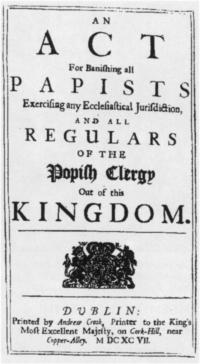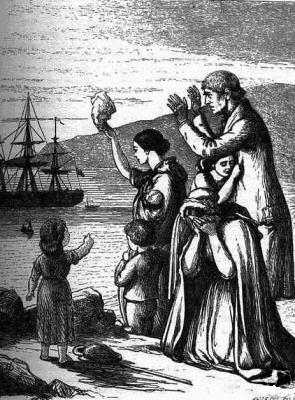His 4815 Goals ->
-
By the end of this Humanities senior seminar you should be able
- List, describe, and rank causes and effects of key events and actors in Irish history from the late 16th to late 20th centuries
- Define, distinguish, and apply abstract concepts of modern European/World history–colonialism, nationalism, racism, decolonialism, nation-building–to specific key events and trends in the Irish narrative
- Find, interpret, analyze, and reference (cite) different types of early modern primary sources (public legal acts, newspaper accounts, and parliamentary debates to private diaries and anonymous notes, especially print culture sources from images to pamphlets)
- Identify, distinguish, and compare evidence of the relation between ideas and action, and between elites, intellectuals, and the populace.
- Select, assess (in terms of value and limitations), and analyze primary sources in order to evaluate arguments about modern Ireland. In other words, do history (research, write, present, lead).
- [Graduates] Identify and compare the main historiographical trends in Irish history.
- List, describe, and rank causes and effects of key events and actors in Irish history from the late 16th to late 20th centuries

How you are assessed (and what you should do): ->
- Online Discussion (drop the lowest) 10%
- Classroom Discussion, including in-class writing/mapping 10%
- Presentation & Write-up 10%
- Late 19th-century Rural and Urban Poor Essay 20%
- Revising the Political Narrative, 1916-1923 25%
- Mid-Term Exam 10%
- Final Exam 15%
Additional Notes
- His 4815 is designated writing-intensive (essays may be submitted to the EWP; review my comments and revise your paper before submitting to EWP). Two essays and a presentation/write-up are due. Write-up and essays due should be typed, 12-point serif font, double-spaced, and use Chicago Manual of Style form of referencing (see online citation guide).
- Presentations will be on an aspect of the Famine or the Diaspora–for example, the Irish-American Fenians (presentation and write -up, 4 pages, 10% final grade).
- One essay (6 pages, 20%) will be a comparison of late 19th-century Irish rural and urban society analyzing the first part of Doyle’s novel for Dublin, readings for rural Ireland, The Man of Aran, etc. [graduates, add reviews].
- The second will be (7-9 pages [graduates 12 pages], 25%) a revision of one scene from Michael Collins or Doyle’s Star Called Henry based on 1916-1923 primary sources (The Times, New York Times, Dáil Debates online, etc.) and the arguments of a couple relevant historians [graduates will expand the historiography for this paper, and present to class]. These essays are relatively brief, but should be focused and thoughtful.
- Participation (based on contribution to discussion, and in-class worksheets/quizzes) is required (20%, half online). Extra credit (up to 5% on final grade) optional extra essay will be on the final. Participation needs focus. To keep us all on task and minimize distractions, let’s not read newspapers, study or write for another class, text, make or receive phone calls, email, or visit sites online unrelated to class during class.
- Generally, more than three absences will adversely affect your participation grade. (Because it is participation I seek, I tend not to countenance "excused” absences, nor to demand notes from various authorities.) Your grade as a whole may suffer if your absences fall on the date of exams. There is, of course, no make-up for reports or the final. Other make-ups will be at my discretion.
You must purchase at the University Bookstore, sign, and turn in both exam books three classes before the Mid-Term (give them to me by week 7). No one may take the in-class mid-term (15%) or the final (20%) without an exam book. The mid-term will consist primarily of statements based on factual narrative, brief interpretation, identifications, essays based on short excerpts from assigned documents, and mapping. The final will focus on excerpts and questions which elicit essays of synthesis and analysis. Improvement during the semester will mitigate disastrous performance early in the course.
